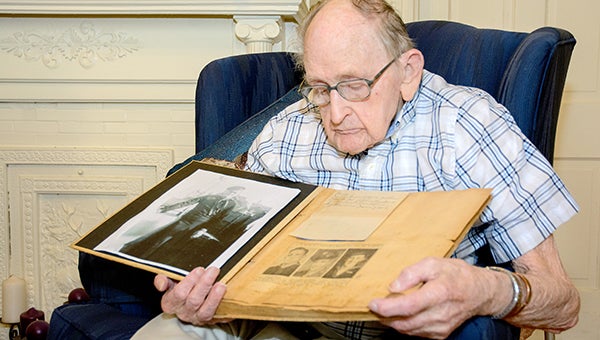Rescues during WWII were just Curtis doing his job
Published 10:00 am Monday, November 7, 2016

- LOOKING BACK: Bill Curtis looks over some of his snapshots and memorabilia from his service in World War II.
By Royce Swayze
The Vicksburg Post
In the early hours of June 6, 1944, the sky was littered with bombers traveling toward France.
“Our job was to rescue people from the Ducks,” said Bill Curtis, referring to the six-wheel-drive truck that doubled as a boat. At daybreak, his ship, the United States Coast Guard 2, was ordered to follow two rocket boats and Duck boats. In case those transports were struck, Curtis and his crew could help save sailors from the water.
From the ship, Curtis watched Allied troops storm the bloody beaches of Normandy. As a Duck with 12 people on board headed for shore, a German artillery shell ripped through the hull. Eleven of the men surfaced, but three were struggling in the waves.
Without hesitation, Curtis dove in the water, pulled the three men out, and administered artificial respiration. He saved them, but don’t call him a hero.
“We were just doing our job,” he insists.
In his long life, Curtis has been a community leader in Vicksburg. He has served in several different roles as a civil engineer with the U.S. Army Corps of Engineers, a Boy Scout leader, and a long-time Meals on Wheels volunteer. Just this year, though, he lost his wife of 60-plus years, as well as two brothers, who also served in World War II.
But that, as Curtis notes, was a long time ago.
In recent years as more have died, many WWII veterans have opted to speak about their war experiences after long silences.
“You’ll hear the military side of the story,” says Curtis’s daughter Leigh Cook, “But to hear the personal stories, those are going to be lost.”
Curtis’ children learned of their father’s story just a few years ago when the World War II Museum in New Orleans interviewed him for a film project.
Beth Maggio, another daughter, said, “we felt like he didn’t want to talk about it.”
“You put it behind you,” says Curtis. “You pay no attention to it, and you don’t live by it.”
Now at age 95, Curtis recalls his war experience once more from his Vicksburg home, with Maggio, Cook and son Mike, who help him out with some of the details.
As he talks, the sun washes the living room with light, but Curtis’ eyes are stormy. He removes his glasses, wipes his brow, and begins to recount what happened all those years ago.
Growing up in a family of seven on a cattle farm outside Hazlehurst, Curtis studied engineering for two years at Copiah-Lincoln Junior College before enlisting in 1942 at age 21. At first, he wanted to join the Navy, but the line at the recruiting station in Jackson stretched for two blocks with men waiting to sign up. He didn’t have time to wait, so he decided to go back home and return the next day. But before he went back to Jackson, his girlfriend’s brother persuaded him to join the U.S. Coast Guard.
After boot camp in Maryland, Curtis was sent to visual signal school to become a signalman second class, even though he was color blind.
“I don’t know and none of those people know how I did it,” Curtis said, laughing.
From New York, Curtis traveled aboard a ship called the USCG 2. The USCG 2 was supposed to transport orders and officers from ship to ship. The work, though, was often dangerous.
One day, after transporting the commandant of the Coast Guard, Admiral Russell Waesche and two captains across the English Channel to France, a major asked the skipper of Curtis’ ship to go up and down a canal at full speed.
“We got down there to the end and come back, and when we did, this major said, ‘Well I ought not guess there were any bombs in there,’” Curtis recalled in an interview with the New Orleans WWII Museum, “I said, ‘Oh my God.’ He has sacrificed us to see if there was any mines in there.”
Curtis continued escorting ships, officers and cargo until the end of the war.
After the guns had stopped in France, Curtis found himself marveling at the marker where Joan of Arc was martyred in Rouen.
It was the one onshore experience he remembered most.
With the city in shambles around him, he paused to reflect on Joan’s sacrifice to liberate her country. Centuries after Joan’s quest, Curtis helped do the same thing for France.
When he returned home, Curtis’s sister Ann was a young girl with no memory of him. She saw him coming up the driveway, and she ran inside to alert her mother that a stranger was approaching. That’s no stranger, her mother told her, that’s your brother Bill.
It had been two years since he and his brothers had left home. Afterward, he completed his education at Mississippi State University and settled in Vicksburg.
Nowadays, he spends a lot of time in his reading chair, next to a stack of books about WWII.
Percy Brown, Curtis’s caretaker, listens sometimes as Curtis reads through those books and says something about the war.
“And I always tell him, ‘You’re an important man,’” says Brown. “And he always says, ‘Well I just did what I had to do.’”





